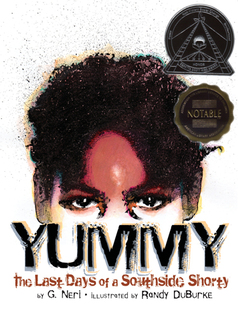TEACHER'S GUIDE FOR:
Yummy
By G. Neri
Illustrations by Randy DuBurke
DOWNLOAD THIS GUIDE AS A PDF
Discussion Questions for Yummy
by G. Neri, illustrated by Randy DuBurke
- Why do kids join gangs? What motivates Robert "Yummy" Sandifer to join the Black Disciples?
-
The main character is called "Yummy" because he likes to eat candy and cookies. Do you think this is a good nickname for him? Why or why not? What is ironic about the nickname?
-
Reread the bottom of page 35. What mistakes does Yummy make in taking the Disciples pledge? What do these mistakes suggest to you about Yummy’s understanding of what he was doing?
-
How do the Black Disciples use kids like Yummy? Why does Yummy try to prove himself with a gun?
-
Roger's older brother, Gary, belongs to the Black Disciples, but Roger does not. How might you explain this?
-
What is Yummy's childhood like? What does the teddy bear tell you about him?
-
Do you think Yummy’s troubled childhood excuses his behavior? Does his age? Explain.
-
Shavon Dean is an obvious victim, but there are other victims in this story. Who are they? Why do you think they are victims?
-
Have you ever been bullied? How did you feel? What did you do?
-
On pages 29–30, Yummy is picked on while in juvenile detention. How does he react? Why do you think Yummy is also a mean bully to others?
-
Have you or someone you know ever been the victim of a crime? How did it make you, or the person you know, feel? How did you, or the other person, feel about punishing the offender?
-
Do you think Yummy understands the enormity of his crime? Why or why not? Find parts of the story that support your answer.
-
How do the adults in your life help you? What have you learned from them? Do the adults in Yummy's life help him in similar ways? How do you think his relationship with adults affects him?
-
Does Yummy have any redeeming qualities? Use evidence in the book to support your response.
-
Do you believe that each person is responsible for his or her own actions? Is Yummy responsible for all of his actions? If not, who else might bear some of that responsibility? Why do you think so?
-
On page 63, Roger wonders if he would have turned out like Yummy if he had grown up like him. What do you think? If Yummy had had a different kind of childhood, do you think he would have been a different person? Explain.
-
If Yummy had been caught by the police, how do you think his life might have turned out? Why do you think so?
-
How do your surroundings, your neighborhood, compare to Roseland, Yummy’s neighborhood? How might your neighborhood or surroundings make a difference in your behavior?
-
Why do the Black Disciples end up killing Yummy? What does that tell you about the Black Disciples? Why isn’t Yummy expecting this?
-
Why do you think Gary returns to his family? Why might it be hard to break away from a gang? What kind of help would someone like Gary need?
-
Parents in Chicago's South Side brought their children to see Yummy in his coffin. Why do you think they did this? What do you think they hoped this would accomplish?
-
Discuss how each of the words below applies to the story of Robert "Yummy" Sandifer. What other words might you use to refer to themes or parts of the story? | Outrage | Violence | Shame | Tragedy |
- In the introduction to the story, the author says, "I invite you, [the reader], to sort through all the opinions . . . and discover your own truth about Yummy." What do you think is the truth about Yummy? Why?

About This Title
Guided Reading:
VLexile:
GN510LInterest Level:
Grades 5 - 12Reading Level:
Grades 4 - 5Themes
Middle Grade, YA interest, Identity/Self Esteem/Confidence, Overcoming Obstacles, Neighbors, History, Families, Coping with Death, Conflict resolution, Bullying, African/African American Interest, Biography/Memoir, Poverty, Integrity/Honesty , Persistence/Grit, Self Control/Self Regulation, Pride, Childhood Experiences and Memories, Grandparents, Teen Interest
Collections
African American English Collection Middle School, African American English Collection High School, Biography and Memoir Middle School, Biography and Memoir High School, Diverse Background English Collection Middle School, Diverse Background English Collection High School, Realistic Fiction High School, Realistic Fiction Middle School, Nonfiction Collection Middle School, Death & Grief, Nonfiction High School Collection, RITELL Middle & High School Collection , Appendix B Diverse Collection Grades 3-6, Coretta Scott King Award Collection, Pedro Noguera Diverse Collection Grades 6-8, Pedro Noguera Reluctant Readers Collection , Pedro Noguera Diverse Collection Grades 9-12, Fluent English, Fluent Dual Language , African American Collection English 6PK, Teaching Tough Topics with Children's Literature Webinar, English Guided Reading Level V, Graphic Novel Collection, Social and Emotional Learning Collection, Perspective-Taking Collection, Trauma-Informed Collection, High-Low Books for Teens: Middle and High School, Immigrant Connection Family Resource Night Collection
Want to know more about us or have specific questions regarding our Teacher's Guides?
Please write us!general@leeandlow.com Terms of Use














